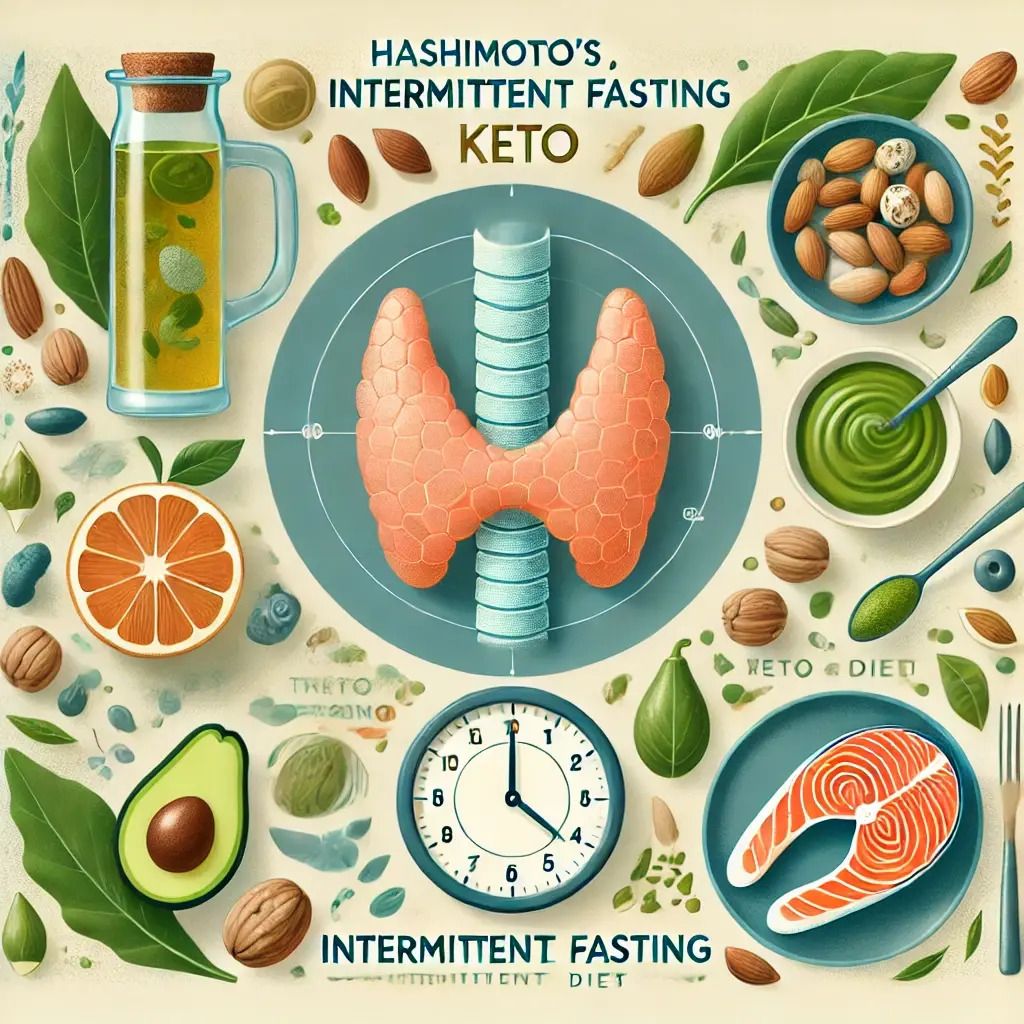- 40-something
- Posts
- Intermittent fasting and keto diet for Hashimoto’s
Intermittent fasting and keto diet for Hashimoto’s
How this combination can be a safe and effective approach.
Over and over, people with Hashimoto’s tell me that they can’t do keto with the excuse that it’s somehow dangerous for their condition, but is this really true or have they simply convinced themselves of this notion so as to not have to give up starchy carbs and sugary treats? Let’s understand what’s really going on here…
Hashimoto’s thyroiditis is an autoimmune condition that affects the thyroid gland, often leading to hypothyroidism (an underactive thyroid). Managing this condition requires a careful approach to diet and lifestyle. Many people wonder if intermittent fasting (IF) and the keto diet can help—or if they could make symptoms worse. The answer? It depends on the individual. Here’s what you need to know:

How intermittent fasting and keto affect Hashimoto’s
Both intermittent fasting and the ketogenic diet have been praised for their benefits, including reduced inflammation, improved metabolism, and better blood sugar control. But for individuals with Hashimoto’s, these approaches require some considerations.
Potential benefits
Reduced inflammation – Both keto and IF have been shown to lower chronic inflammation, which may help reduce autoimmune attacks on the thyroid.
Improved insulin sensitivity – Many people with Hashimoto’s struggle with insulin resistance. Keto and IF help stabilise blood sugar and improve metabolic health.
Balanced gut health – A well-planned keto diet and intermittent fasting can support gut health, which is crucial because leaky gut is often linked to autoimmune diseases.
Better energy and mental clarity – By using ketones for energy and stabilising blood sugar, these approaches can help reduce fatigue and brain fog.
Possible concerns
Lowered thyroid hormone levels – Fasting and keto can sometimes reduce T3 (active thyroid hormone) levels, potentially worsening symptoms.
Increased cortisol and stress response – IF can raise cortisol (stress hormone) levels, which may aggravate Hashimoto’s symptoms.
Nutrient deficiencies – Keto diets can sometimes lack key thyroid-supporting nutrients like iodine, selenium, zinc, and magnesium.
How to do IF and keto safely with Hashimoto’s
If you have Hashimoto’s and want to try intermittent fasting and keto, here’s how to do it in a way that supports your thyroid health:
Start with a gentle IF approach – Begin with a 12:12 or 14:10 fasting window before moving to 16:8. Avoid prolonged fasts (24+ hours) initially.
Focus on anti-inflammatory keto – Eat healthy fats (avocados, olive oil, fatty fish), lean proteins, and non-starchy vegetables. Avoid processed keto foods.
Support the thyroid with key nutrients – Ensure you get enough selenium (Brazil nuts), iodine (seaweed, fish), zinc (pumpkin seeds, beef), and magnesium (leafy greens, nuts).
Listen to your body – If you feel fatigued, experience hair loss, or worsening symptoms, adjust your diet and fasting schedule.
Consider carb cycling – Some people with Hashimoto’s do better with a moderate-carb keto approach or carb refeed days (higher carbs 1-2 times a week).
Manage stress and sleep – Poor sleep and high stress levels can make fasting and keto harder on the thyroid. Prioritise relaxation and good sleep hygiene.
Should you take an iodine supplement?
Most people with Hashimoto’s should NOT take high-dose iodine supplements (such as kelp or Lugol’s solution). If you suspect iodine deficiency, get tested before supplementing.
Intermittent fasting and the keto diet can be beneficial for people with Hashimoto’s if done correctly. However, they must be personalised to avoid potential downsides like hormone imbalances and increased stress. Start slow, focus on nutrient-dense foods, and listen to your body. As for iodine, some people may need it, but too much can trigger flares. It’s always best to test before supplementing, and rather get iodine directly from food sources instead.
Don’t make excuses, just keto carefully and consistently xx
Umayya